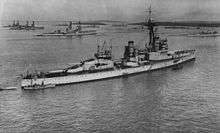Arthur Forbes-Sempill

Rear-Admiral The Hon. Arthur Lionel Ochoncar Forbes-Sempill (24 September 1877– 9 May 1962) was a Scottish officer of the Royal Navy active in the First World War.
Biography
Arthur was the fourth son and youngest child of William Forbes-Sempill, 17th Lord Sempill and Frances Emily Abercromby, daughter of Sir George Abercromby.[1] His three elder brothers, John, Douglas and Robert, all served in the Army.[2]
In January 1898, he was assigned to HMS Centurion as a sub-lieutenant,[3] promoted to lieutenant on 30 June of the following year,[4] and then assigned to HMS Victorious.[5] In 1900 he was assigned to the HMS Vernon for torpedo training,[6] and in June 1902 he was re-posted to the school,[7] before he the following month was posted as torpedo officer to the battleship HMS Empress of India,[8] serving in the Home Fleet. In December 1903 he was posted to the HMS Euryalus,[9] in May 1906 to the HMS Edgar,[10] in September 1908 to HMS Bacchante,[11] and in May 1910 to HMS King Alfred.[12] He was then promoted Commander, and assigned to HMS Albemarle in 1911.[13]
First World War

In July 1914 he was assigned to HMS Dominion,[14] in which he served during the early part of the First World War. He was later posted as executive officer of the battleship HMS Valiant, where he saw service at the Battle of Jutland, and was recommended for promotion to Captain as a result.[15] He later commanded the cruisers HMS Blonde and HMS Cordelia, and was present in the latter at the surrender of the German navy in 1918.[16] By 1919, he was in command of HMS Colossus.[17]
He married Muriel Emily Spencer in 1903, and was divorced in July 1914, on the grounds of adultery; the case was not defended.[14] His ex-wife remarried Wilfrid Ashley, 1st Baron Mount Temple. He remarried in 1919, to Helen Allen;[17] she died shortly thereafter, in 1921.[18] He remarried for a third time in 1926, to Mary Holland, an American.[19] He had one daughter from his second marriage, Janet, and one son by his third marriage, John Alexander,[20] who would later inherit the baronetcy held by Arthur's father, after it had passed through his elder brother John and his nephew Ewan.[21]
He died at his home in Wigtownshire on 9 May 1962.[22]
References
- ↑ Lodge, Edmund (1892). The Peerage and Baronetage of the British Empire as at Present Existing: Arranged and Printed from the Personal Communications of the Nobility ... Hurst and Blackett, Limited. p. 561. Retrieved 30 September 2016.
- ↑ p.6 Forbes, Ewan (1984). The aul' days. Aberdeen: Aberdeen University Press. ISBN 0-08-032415-0.
- ↑ "Naval & Military Intelligence". The Times. 17 January 1898. p. 10.
- ↑ "Naval & Military Intelligence". The Times. 13 July 1899. p. 10.
- ↑ "Naval & Military Intelligence". The Times. 22 July 1899. p. 13.
- ↑ "Naval & Military Intelligence". The Times. 15 September 1900. p. 10.
- ↑ "Naval & Military intelligence". The Times (36800). London. 21 June 1902. p. 12.
- ↑ "Naval & Military Intelligence". The Times. 5 July 1902. p. 9.
- ↑ "Naval & Military Intelligence". The Times. 18 December 1903. p. 11.
- ↑ "Naval & Military Intelligence". The Times. 10 May 1906. p. 12.
- ↑ "Naval & Military Intelligence". The Times. 26 September 1908. p. 13.
- ↑ "Naval & Military Intelligence". The Times. 30 May 1910. p. 8.
- ↑ "Naval & Military Intelligence". The Times. 26 August 1911. p. 11.
- 1 2 "Scottish Divorce Suit". The Times. 10 July 1914. p. 4.
- ↑ Officers recommended for promotion after Jutland
- ↑ "Naval & Military Staff & Command Changes". The Times. 1 May 1922. p. 8.
- 1 2 "Marriages". The Times. 27 May 1919. p. 15.
- ↑ "Deaths". The Times. 21 June 1921. p. 1.
- ↑ "Marriages". The Times. 4 September 1926. p. 13.
- ↑ Sir John Alexander Cumnock Forbes of Craigievar, 12th Bt., The Peerage.
- ↑ p. 1082, Charles Mosley, ed. (1999). Burke's peerage and baronetage. 1 (106th ed.). Burke's Peerage. ISBN 2-940085-02-1.
- ↑ "Obituaries". The Times. The Times Digital Archive. 10 May 1962. p. 18.